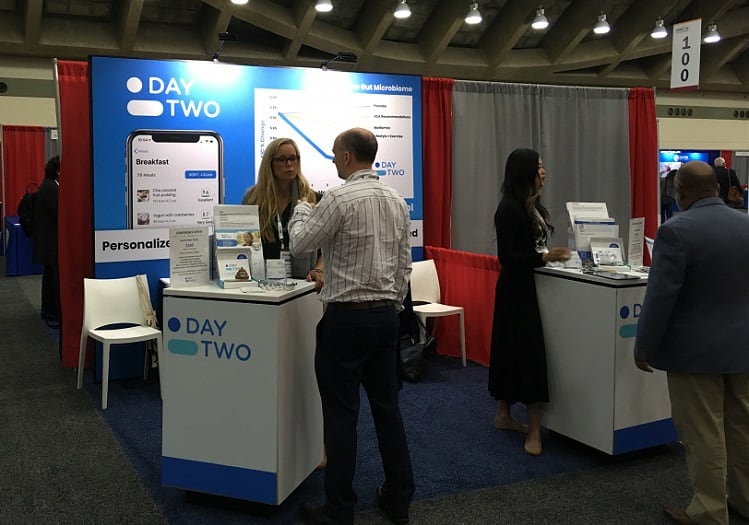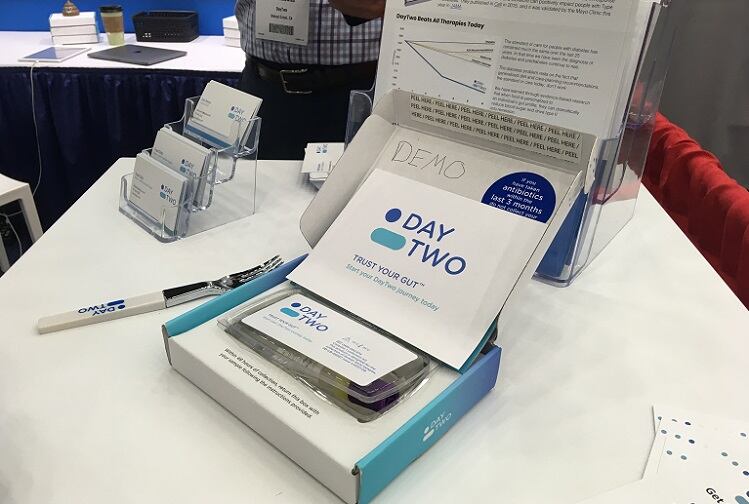DayTwo is a company that analyzes the microbiomes of its users through stool samples. It sends kits containing the directions and appropriate tools to collect stool, which the user then sends to the lab. Within a few weeks, they will receive a breakdown of their microbiome composition as well as recommendations of what food to eat.
The company uses an advanced algorithm to make these food predictions, one that was designed to help consumers manage their blood sugar levels and potentially prevent from other chronic conditions.
This year, two new papers offer evidence to validate DayTwo’s methodology. The first was published in JAMA Network in February, which outlines the findings of Mayo Clinic and DayTwo researchers.
“The Mayo trial was our validation study of the original Cell paper,” Josh Stevens, president of DayTwo, told us yesterday at the Nutrition 2019 conference in Baltimore.
He was referring to the 2015 paper published in Cell written by Weizmann Institute of Science researchers, the first study supporting DayTwo’s methods. It investigated whether an algorithm could predict if a certain food will make the blood sugar of a certain individual with a certain microbiome profile spike. It could.
“The Mayo trial replicated this protocol but on 323 subjects in Minnesota and Florida,” Stevens said. “It showed that the algorithm could be replicated in the US using US subjects, on US soil, with US food, and US microbiome profiling.”
The Mayo Clinic findings were significant, Stevens said, because from a scientific method standpoint, it proves that the results are repeatable. Secondly, it proved that the Cell paper results weren’t just for an Israeli or Mediterranean model, or an exception for the Middle East.
“It proved that this is actually a durable model that’s usable across territories and across ethnicities,” Stevens added.
Another paper was published last month in The American Journal of Clinical Nutrition, an analysis of the same data that was published in JAMA Network. “That one is a qualitative study of the results, which attests to the statistical significance of the work,” he said.
“That both JAMA and the AJCN picked it up is promising. We’re very concerned with peer-review and the respect of the scientific community.”
Going B2B
In Israel, a country of 8 million people, the largest health maintenance organization (HMO) Clalit serves 5 million people. In August 2018, Clalit became a customer of DayTwo.
“The Israel market has really blown up for us,” thanks to the partnership with Clalit, Stevens said. “That’s the type of customer that would be great to have in the US or any country, so that’s helped us diversify our model from B2C into B2B.”

For its expansion in the US, he added, DayTwo is focusing on the B2B route. That’s one reason why DayTwo is exhibiting at the Nutrition 2019 conference, hosted by the American Society for Nutrition and attended by academic and industry researchers in the nutrition space.
“We’re primarily focused on clinicians and employers and peers,” Stevens said. “The conference helps us reach a number of clinicians as we continue to build our network of doctors that use the service in their clinic today.”
There are over 200 clinics in the US that are using DayTwo with people with diabetes, he added, “and that’s really helping us building the dataset.” Further clinical trials are planned and ongoing, Stevens added.
The company has around 100 employees worldwide, 75 in Israel and 25 in San Francisco. The company is looking to double its employee count in the next year.
Source: JAMA Network
Published online, doi:10.1001/jamanetworkopen.2018.8102
“Assessment of a Personalized Approach to Predicting Postprandial Glycemic Responses to Food Among Individuals Without Diabetes”
Authors: Helena Mendes-Soares, et al.
Source: The American Journal of Clinical Nutrition
Published online, https://doi.org/10.1093/ajcn/nqz028
“Model of personalized postprandial glycemic response to food developed for an Israeli cohort predicts responses in Midwestern American individuals”
Authors: Helena Mendes-Soares, et al.

